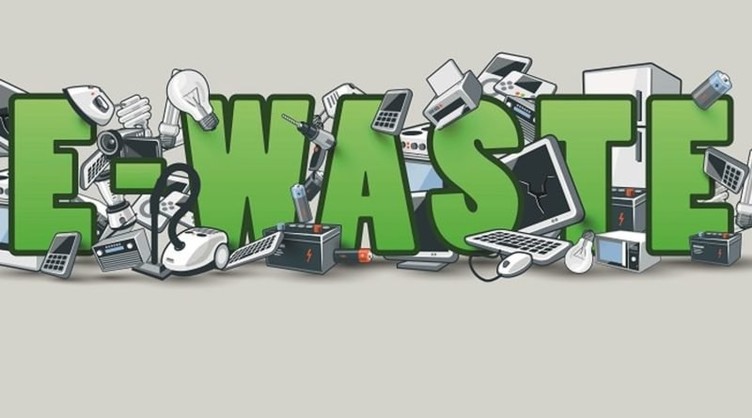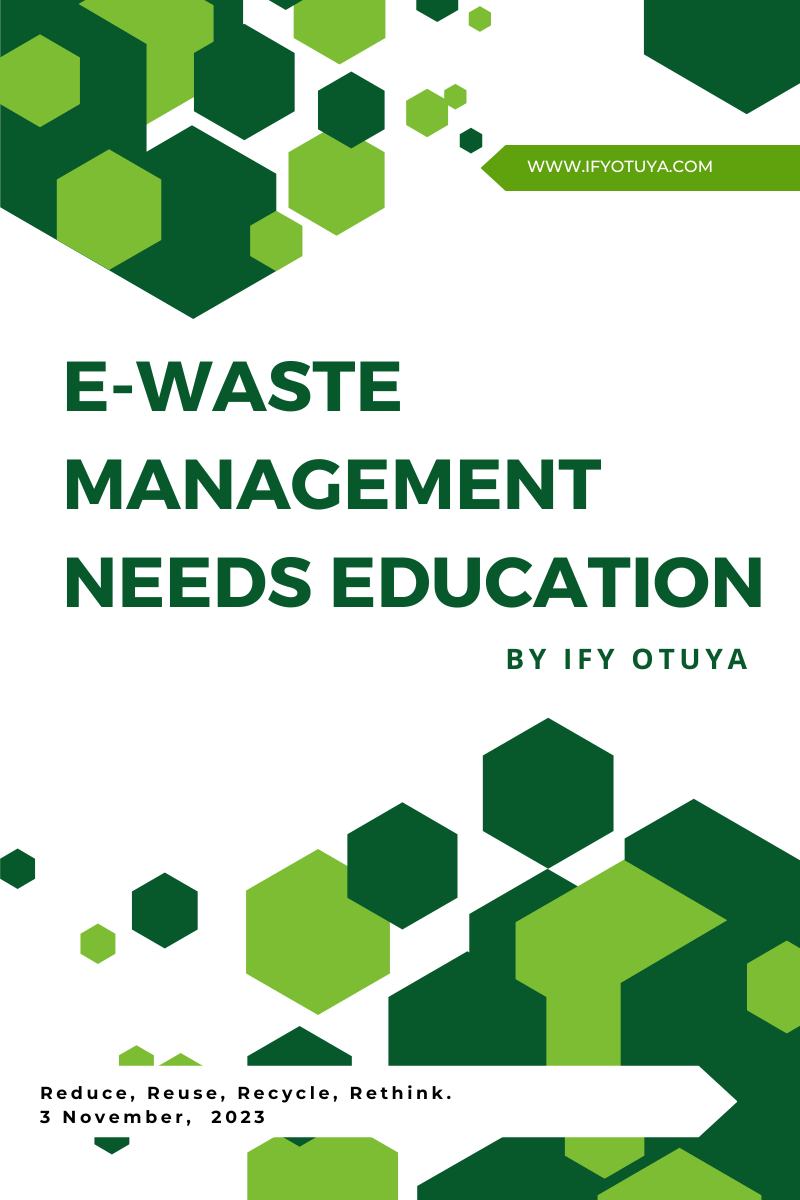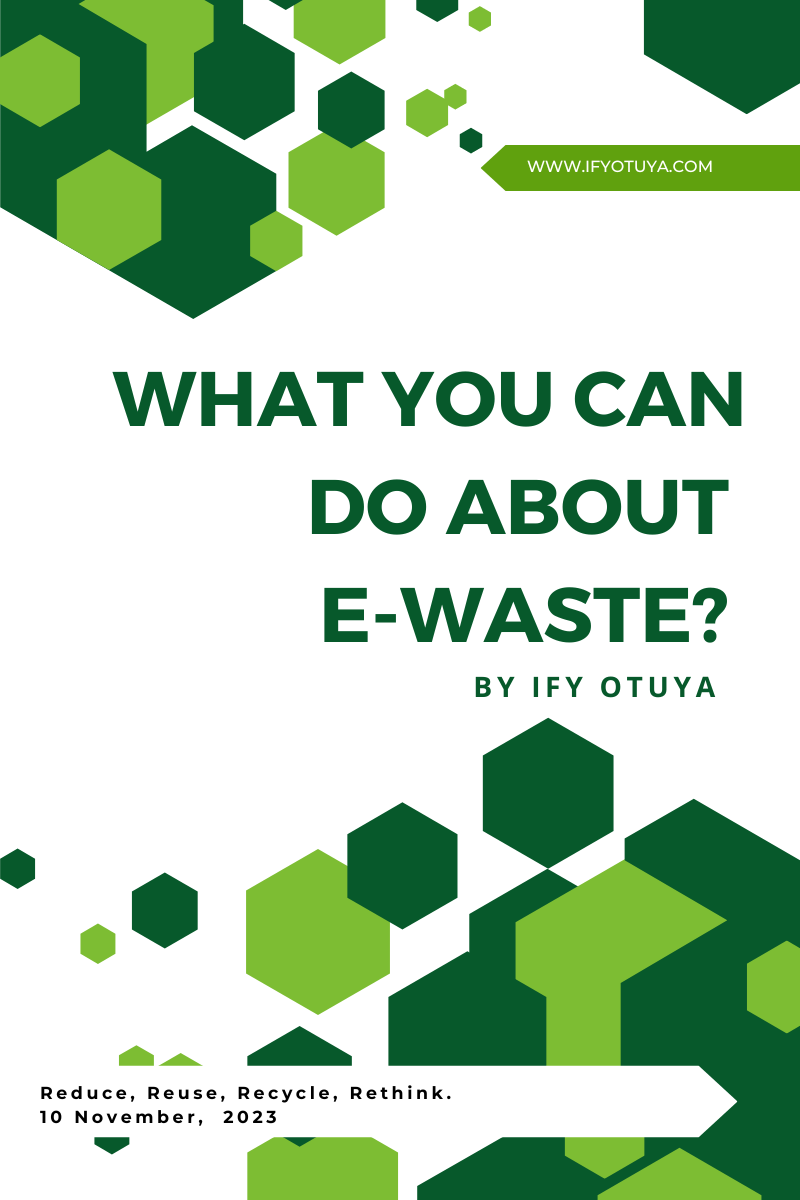– by Ify Otuya
Electronic and electrical devices are great at enhancing our relationships, lifestyle and businesses. As they reach their end of life however, a dangerous and mounting problem persists about how to manage the disposal of this increasing number of devices globally. The problem is dangerous because the improper disposal of electronic waste (e-waste) poses proven threats to our health, environment, data security and economy. Likewise, the discard-repeat-cycle of modern electronics consumerism and the increasing frequency with which higher income consumers renew devices of newer released models, are key at identifying what drives this mounting problem.

Solutions exist, however. Studies show that clearly, lifestyle and attitudinal cultural change is needed through awareness, sensitization and other forms of education to advocate responsible consumption. Apart from promoting and advocating right-to-repair initiatives so that the life cycle of devices are extended where possible, appropriate collection and disposal channels that adhere to best practices must also be created and sustained to establish solid e-waste management infrastructure in every country. In practice, society must be sensitized to make use of this infrastructure for the long-term and in fact permanent duration, to achieve management success. Consequently, education is needed. Education is needed from the ground-up and across the width of all spectra to not only impact social change but to build capacity for industry.
About 50 million metric tonnes of e-waste is generated worldwide every year. Only a fifth (20%) of this is disposed through proper electronics recycling channels. 4% is found disposed in residual waste and the fate of 76% is unknown. These are facts according to the United Nations University’s Global E-waste Monitor investigation and report. No one knows whether the 76% was dumped and where it was dumped, incinerated and where it was incinerated, or whether it is now stacked piled in a warehouse and where this warehouse is.
The world’s missing e-waste indicates failure on our part at formulating and strengthening e-waste policy regulations. The non existent data on the whereabouts of over 30 million metric tonnes of e-waste also highlights lost economic opportunities to provide sound management of e-waste by tracking, collecting and documenting e-waste flows. These are two undertakings that primarily, would have called for education services (specialized trainings, sensitization workshops, public awareness initiatives, etc) and would have led to jobs creation; thereby not only directly building capacity for industry, but further helping, to actualize even more outlined objectives of the United Nations’ Global Goals or Social Development Goals (SDGs).
Secondarily, the latter undertaking would have opened doors to seizing opportunities for the ilk of solution-based entrepreneurship that matches the challenge of changing social trends, in the world of e-waste. They are opportunities entrepreneurs may be educated about on an in-depth scale. Likewise, businesspeople could always benefit from business boot camps designed to help them scale up their business operations, or to just successfully navigate a plethora of challenges associated with running general e-waste recycling processes.
Other ensuing benefits of applying education to achieving sound e-waste management are just as easy to see. A digitalized approach to education may be adopted and will do very well to serve the modern day community mobilization thrusts of activists and various civil society actors. It can indeed also be a crucial adhesive for developing the larger ecosystem, by illuminating the dots that represent and link the informal player with the formal player, and the public sector with the private sector. This could be an effective tool to spotlight and promote development happenings, not just in a specific number of countries (e.g. China, U.S, India or West African countries) or in any given niche e-waste sector (e.g. solar e-waste), but on a global and truly cross-cultural scale.
Offline, the world of informal handlers may be disrupted but only to upgrade it, not replace it. They can benefit from getting introduced to and familiar with how to use environmental protection gear, thus stemming threats posed to health and environment.
Lastly, the development of skills for salespersons, towards data destruction service sales and/ or the sales of any other environmental service required for keeping e-waste management businesses afloat, is just as much a recognized education deliverable.
The above is by no means an exhaustive coverage of education’s effectiveness or potentials towards achieving sound e-waste management, but it is a proffered soft landing, albeit robust, for visualizing the role education can (and does) play, as a viable service for achieving sound e-waste management. Development within e-waste management does not merely benefit from educational services, but of a truth, it cannot materialize without educational services. E-waste management needs education.
No industry can thrive – nevertheless effectively function – within a framework of servicepersons performing independently of the consumers who occupy the very end of service process lines. Who are the servicers ‘servicing’? And if there is no bond between the servicer and the serviced, can the servicer truly stay afloat? There needs to be a synergy that is symbiotic in nature so that the needs of all parties, being parts of the larger whole, are well met. Resultantly, organically or non-organically, a consciousness of the value that each party brings to the table takes seat. E-waste management is, none the least of all industries, typified by these dynamics and education is the innovative application that builds its bridges.
E-waste is now the fastest growing waste stream in the world. Awakening to the need for its sound management is without a shadow of doubt, a duty that calls us all – every single one of us from individuals to communities, civil society, governments and businesses. There is no better strategy to effectively engage this mounting problem, right now, than the cogent call for education.
Author’s Bio:

Ify Otuya is a passionate advocate for addressing e-waste challenges in Africa. As the Founder of June E-waste Academy, she has spearheaded the first e-waste academy in the African region, dedicated to promoting e-waste education, awareness, and sustainable solutions. Her commitment to this cause extends beyond the classroom, as she has also authored the book “E-waste Art,” a creative exploration of e-waste’s impact on our world. Ify’s mission is to bridge the knowledge gap surrounding e-waste issues and inspire positive change. For inquiries, collaborations, or to connect with her on this vital mission, feel free to reach out to her via email at missotuya@gmail.com.


